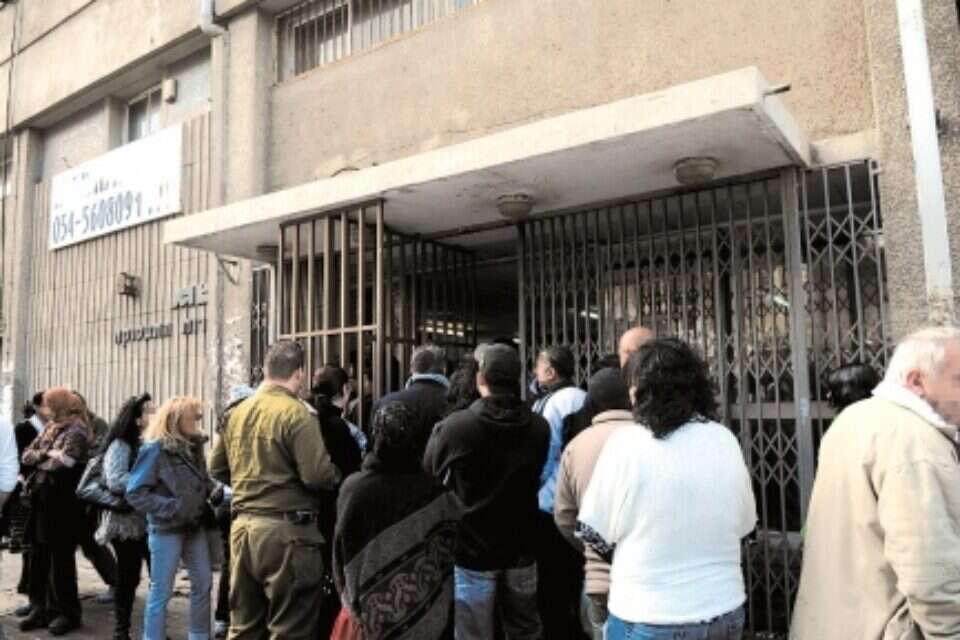For the first time since the outbreak of the war, there was a significant decline in the number of job seekers. That number was 297,8 in December, 10.2% less than November. This is according to the Employment Service's "Pulse of the Labor Market" report, which summarizes the movements recorded in the Israeli labor market during December.
During December, the number of job seekers declined by 34,10, which, as stated, is 2.297 percent less than in November. At the end of December, the number of jobseekers was 8,268 when not seasonally adjusted and 331,9 when seasonally adjusted. That compares with <>,<> in November.
Knesset Spokesperson's Office
This decline, the Employment Service explains, is an expression of the recovery of the Israeli labor market and its entry into an emergency routine, a process that began already at the beginning of November with the consistent decline in the number of new job seekers. Moreover, the Employment Service believes that one of the factors contributing to the market's adjustment to work even in emergency conditions is the government's decision not to extend the period of eligibility for unemployment benefits sweepingly, contrary to the policy adopted during the COVID-19 crisis. This decision has led to the market having to adapt to work even in emergency conditions, and the result is a decline in the number of job seekers.
However, the Employment Service clarifies, it is still too early to know whether the downward trend will continue in the coming months and at what intensity, and it is also too early to assess to what extent, if at all, the number of income supplement claimants will rise as a result of job seekers who will end their eligibility for unemployment benefits but will find it difficult to return to the workforce. For the time being, and based on data for November and December, it appears that the Israeli labor market is recovering and adapting to an emergency routine. The service also reports that already at the beginning of January, the significant downward trend is evident, and the Employment Service estimates that we will see continued declines next month as well.
Commercial center in Dimona //, Photo: Dudu Greenspan
Encouraging employment data
According to Employment Service data, after two months of increase, during December there were declines in both the number of unemployment claimants (29,2, and in fact a decline of 10.9 percent compared to their number in November) and the number of income supplement claimants (1.9,3, and in fact a decline of 3.236 percent compared to their number in November). The number of unemployment claimants stood at 6,54 this month, while the number of income supplement claimants stood at 1,<>, very close to the number before the outbreak of the war.
These declines are further evidence of the recovery of the labor market, but the Employment Service cautions that in view of the expected prolongation of the war, there may be those who have completed the period of eligibility for unemployment benefits who will find it difficult to return to the workforce and will need a social safety net, and as a result, the number of income supplement claimants may increase in the coming months.
A comparative examination of the number of job seekers by occupation in December compared with their number in October, at the beginning of the war, shows that the occupations most affected were workers engaged in providing and gathering information with an increase of 73.3%, occupations of unskilled workers in mining and construction with an increase of 66.2%, and installers and repairers of electrical equipment (56.2%), and bus and heavy truck drivers (55%), as well as supervisors of building maintenance and household work (54%).
Big Shopping Center (Archive), photo: Herzi Shapira
The Significant Impact – Sales and Services Industry
Widespread injuries were also recorded among various occupations in the sales and services industry, such as store sellers (48.9%). In contrast, there were also increases in almost all occupations, the most moderate among highly skilled workers such as software developers and physicians or those with health needs as nurses and nursing or educational caregivers as teachers and teaching staff.
This month, as in the entire past year, Rahat and um al-Fahm led the list with job seekers of 11.8% and 11.4%, respectively. All 15 cities with the highest rate of job seekers are cities from the periphery, with 4 out of the top 5 being Arab or mixed cities.
On the other hand, Ramat Hasharon with an increase of 3.9%, Ra'anana with an increase of 3.89%, and Kfar Saba with an increase of 3.88%, recorded the lowest rates. In all cities, except Eilat and Rahat, there were declines in the number of job seekers, the most significant were recorded in Bnei Brak (18.9%) and Kiryat Gat (15.6%), and the least significant were recorded in Lod (1.4%) and um al-Fahm (1.6%)
Employment Bureau, Photo: Joshua Yosef
Rami Graor, Director General of the Employment Service: "Employment Service data indicate the resilience of the Israeli labor market and its ability to adapt to emergency routines and emerge quickly from employment crises. We saw this in Corona and we are witnessing it even now with iron swords. However, it is still too early to know how things will develop in the coming months, given that the war is expected to prolong. I would like to appeal to the hundreds of thousands of job seekers who remain to continue to be assisted by employees of the Employment Service, who will help you return to the workforce and strengthen your skills and skills towards an optimal return to the workforce."
Wrong? We'll fix it! If you find a mistake in the article, please share with us

